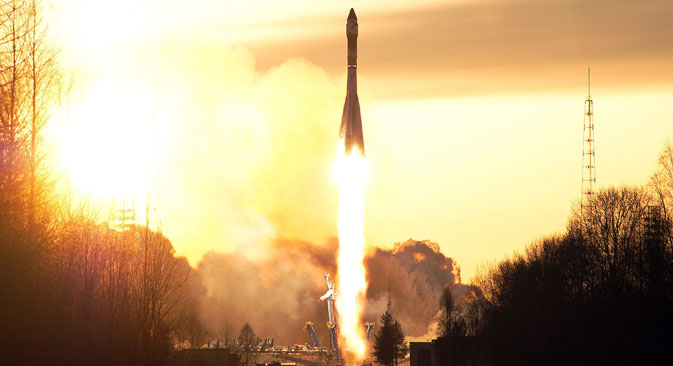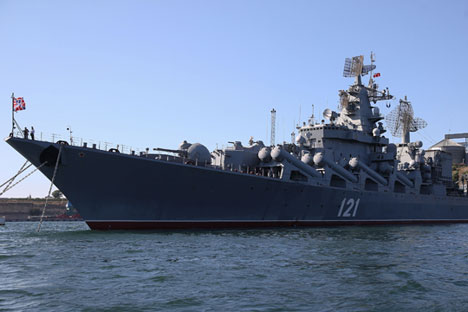Press Digest: Launch of Russian foreign ‘submarine hunter’ satellite fails

A Soyuz rocket carrying a military satellite blasts off from the launch pad at Plesetsk Cosmodrome in 2009. The Soyuz rocket was also used in the failed attempt to launch the Kanopus-ST satellite on Dec. 5, 2015.
Andrei Morgunov / TASSDefense Ministry loses satellite capable of tracking foreign submarines
The Russian Space Forces have failed to put into orbit the Kanopus-ST satellite, which is fitted with equipment for detecting submerged foreign submarines, the daily broadsheet Izvestia reports.
In addition to Kanopus-ST, the launch on Dec. 5 also involved a calibration sphere (a mockup for testing the software of the new upper-stage rocket Volga, which – together with the new Soyuz 2.1v rocket – was on only its second ever space mission). The sphere was attached to the adapter that linked the booster and the main satellite.
Video by Mil.ru / YouTube
A source in a Defense Ministry research institute associated with the launch told Izvestia that, according to preliminary findings, the launch of the calibration sphere went according to plan, but Kanopus then failed to detach from the booster and become operational.
Initially designed as a weather satellite, Kanopus-ST was first described as a submarine hunter in 2010: Vladimir Boldyrev of the Kosmonit scientific and technological center operated by the company Russian Space Systems said at the time that Kosmonit “had designed a Konopus-ST module which, having been put into a low-earth orbit, will be capable of remote ocean sensing, monitoring the surface and underwater situation and detecting submerged submarines.”
This is the first setback suffered by the Russian Space Forces this year. The other two failed launches this year were carried out by the Federal Space Agency (Roscosmos): in April, the launch of a Progress rocket with cargo for the International Space Station ended in failure, and in May, a Proton rocket failed to take a Mexican telecommunications satellite into space.
Pentagon claims 43 percent of success against ISIS in Syria
The U.S. military have claimed that it is they rather than Russia who have seriously undermined ISIS’s oil infrastructure, the Svobodnaya Pressa news website reports.
Thanks to attacks by the U.S.-led international coalition in the last month, the Islamic State jihadist group has lost 43 percent of its revenue stream from oil sales, chairman of the U.S. Joint Chiefs of Staff Joseph Dunford said at a hearing in the U.S. Congress on Dec. 1.
However, this view is clearly not shared by the U.S. Commander-in-Chief, President Barack Obama. Speaking in Paris, as reported by the White House, he said that over the past two months things in Syria had not changed at all.
And yet, Western politicians and the media, including in the U.S., increasingly admit that things in Syria have started to change and not thanks to the U.S. or its coalition forces. Here is, for example, what an editorial in The Washington Times said: “Messrs. Putin and Hollande are working toward putting together the serious multinational force that President Obama says he has already assembled, though no one has been able to find it.”
“American policy-makers and presidential candidates must now make a fateful decision — join Moscow in an alliance against ISIS, or persist in treating the Kremlin as an ‘unworthy partner’,” point out American pundit and Princeton University professor Stephen Cohen and editor in chief of The Nation magazine Katrina vanden Heuvel.
Russians under 21 may be banned from buying cigarettes
A draft law has been submitted to the State Duma banning people aged under 21 from buying and smoking tobacco, the Komsomolskaya Pravda tabloid daily reports. The bill was initiated by a member of the Federation Council's economic policy committee, Anton Belyakov.
The note to the draft law cites experts from the National Narcology Research Center as saying that “the highest percentage of smokers among young people are those aged between 18 and 20.”
“Which means that it is this age group that should be targeted with additional measures to influence the consumption pattern, including through restrictions,” Belyakov said.
The authors of the bill expect that the legislation would make it possible to reduce the overall number of smokers in Russia.
Read more: Russian journalist in Syria: We came within a whisker of death>>>
All rights reserved by Rossiyskaya Gazeta.
Subscribe
to our newsletter!
Get the week's best stories straight to your inbox
